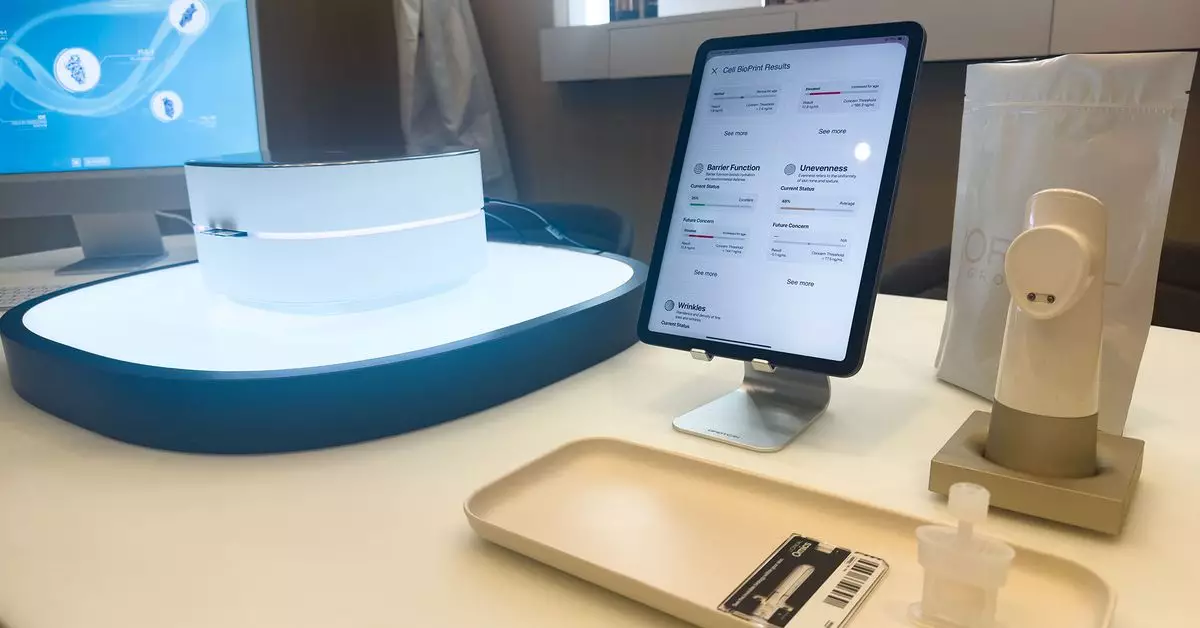Las Vegas, with its notoriously dry climate, presents a formidable challenge for skin health enthusiasts, particularly during events like CES 2025. The arid atmosphere can wreak havoc on even the most diligent skincare routines, resulting in uncomfortable consequences like nosebleeds and chapped lips. As a seasoned reporter experienced with wearables and health tech, the necessity of properly understanding one’s skin condition becomes even more pressing in such low-humidity environments. Thus, one begins to question whether our myriad products—including all manner of moisturizers and serums—are genuinely effective or whether they merely serve as a temporary balm to deeper issues at hand.
In this quest for clarity, L’Oréal’s Cell BioPrint emerges as a potential game-changer. As a novel technology that undergoes the analysis of skin samples, it promises to deliver personalized insights into one’s skin health, grading various factors such as oiliness, wrinkle formation, and even skin tone. This sophisticated device is not merely a toy for beauty enthusiasts; it’s akin to having a mini-laboratory that assesses the proteins present in the skin, providing a more comprehensive understanding of future skin concerns and sensitivities to popular ingredients like retinol.
During my testing of the Cell BioPrint, the process was astoundingly user-friendly. L’Oréal is initially piloting this tool in dermatology offices and clinics, ensuring that professionals handle the testing for optimal accuracy. The collection of skin samples, analysis, and subsequent report generation does not require much effort from the user, but it results in a plethora of information that can serve as an actionable roadmap for skincare regimens.
Upon receiving my results, I discovered that my chronological and biological ages aligned impressively. Interestingly, the analysis indicated not only current skin health but also potential vulnerabilities as I age—highlighting the importance of ongoing skincare diligence. While I personally didn’t struggle with pore size, the report guided me toward incorporating products with ceramides and Vitamin C. Perhaps most significantly, I learned that I am highly receptive to retinol, which allows me to confidently incorporate it into my routine without fearing adverse reactions.
This new level of targeted skincare advice not only helps eliminate unnecessary purchases, saving both financial and physical resources, but it also allows the consumer to prioritize their efforts based on scientific insights rather than vague marketing claims. For instance, rather than searching for products that promise to shrink pore size, which I do not need, I can focus on other, more pertinent concerns.
While immediate results from such technologies are compelling, their long-term validity depends heavily on the underlying science. Skepticism remains pervasive in the beauty industry, where companies often make extravagant claims without robust supporting evidence. Addressing this concern, Guive Balooch, the global vice president of L’Oréal’s Technology Incubator, emphasized the extensive research underpinning Cell BioPrint.
L’Oréal invested years into a research program involving 800 biologists, utilizing proteomics—the study of protein expression— to identify key biomarkers that reflect skin health. After extensive testing on a diverse population, they distilled down to five proteins tied to skin health, including two linked to retinol responsiveness. This level of research establishes a credible foundation for the insights generated by the Cell BioPrint, reinforcing consumer trust in this innovative technology.
Cynical voices might interpret this technology as a marketing ploy to encourage overspending on products in a saturated market. However, Balooch argues that the actual aim is to promote informed consumerism, steering individuals away from unnecessary purchases while directing them to effective solutions. In a landscape inundated with conflicting advice and trends, gaining access to scientifically-backed information is empowering—allowing consumers to navigate the world of skincare with greater confidence.
In a cultural landscape where skincare routines can sometimes bear a semblance to financial investments, having the tools to discern effectiveness is invaluable. Like many skincare enthusiasts, I too have felt the pull of trending products that promise the moon, only to end up disappointed. Understanding that I can make educated choices based on the analysis provided by Cell BioPrint means I might finally break free from the cycle of chasing every fad.
In an industry often overlooked as superficial, L’Oréal’s Cell BioPrint bridges the gap between technology and self-care, offering tangible data that elevates skincare beyond mere beauty rituals to a more informed practice. The future of skincare lies in personalized insights and data-driven recommendations, moving away from the one-size-fits-all approach. As the beauty landscape evolves, embracing this kind of personalized technology may very well redefine our relationships with the products we choose to use, empowering us to invest wisely in our skin’s health and longevity.

